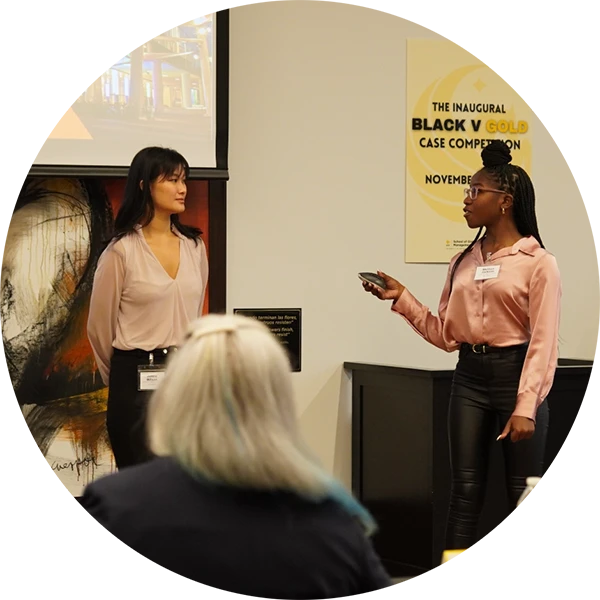Health management and informatics can be serious business. That’s why the UCF School of Global Health Management and Informatics places a strong focus on balancing academics with social connections through student clubs and organizations, mentorship opportunities, immersive learning experiences, internships and more!
Our highly engaged faculty, staff, alumni network help you find professional development opportunities that allow you to explore your interests and develop new skills, all while forging friendships to last a lifetime.
By participating in these dynamic opportunities, you’ll build meaningful relationships and gain hands-on experience that can give you an edge when applying for internships, fellowships or full-time jobs. From networking events and leadership opportunities to case competitions and community service, our student experiences are designed to help you succeed.
Get involved today to shape your tomorrow!
Student Organizations
The School of Global Health Management and Informatics offers students opportunities for networking and career development through several student associations. Join an organization to connect with peers, volunteer at events, tour healthcare facilities and explore job opportunities.
American College of Healthcare Executives (ACHE) at UCF
Our mission is simple: to help UCF students like you reach your career goals in healthcare leadership while serving as your connection to the nationwide American College of Healthcare Executives (ACHE) network. ACHE is a national organization with chapters across the country, including the Central Florida chapter right here in our region. As a student, you can join this chapter as a Student Associate, open to students from all universities in the area. But as a UCF student, you get something extra—exclusive access to ACHE at UCF. This dual membership gives you all the benefits of being a Student Associate while unlocking additional events, resources and opportunities tailored just for you. Ready to build your network and elevate your career in healthcare leadership? Join us today!
Healthcare Case Club
 Case competitions allow for a one-of-a-kind hands-on experience where teams are given a real-world problem in a health system to solve within a certain time frame (typically 1 day – 2 weeks depending on the competition). The learning you gain through a case competition is far beyond what any one class can provide for you and is beneficial when applying for internships or fellowships. For more information, contact the Club.
Case competitions allow for a one-of-a-kind hands-on experience where teams are given a real-world problem in a health system to solve within a certain time frame (typically 1 day – 2 weeks depending on the competition). The learning you gain through a case competition is far beyond what any one class can provide for you and is beneficial when applying for internships or fellowships. For more information, contact the Club.
Health Services Administration Student Association (HSASA)
Health Services Administration Student Association (HSASA) is a great organization for undergraduate students passionate about a career in healthcare administration. We’re all about helping you build connections and gain insight into this dynamic field. Our members get the chance to network with professionals from various healthcare organizations who share their career journeys and tackle important topics in the industry. Throughout the year, we host a variety of activities, including social events, intramural sports, philanthropic projects and fundraisers. Whether you’re looking to meet like-minded peers, learn from industry experts, or just have a good time, HSASA has something for you. Reach out to us to learn more!
Institute for Healthcare Improvement Open School (IHI)
The Institute for Healthcare Improvement (IHI) Open School Chapter at UCF is an extracurricular organization dedicated to real-life experiences and making an impact. Our organization gives you the chance to dive into healthcare challenges, analyze problems, come up with ideas for change and measure the results of your work. We partner with local clinics on healthcare improvement projects, giving you an opportunity to lead and contribute directly to our community. It’s a great way to build your skills, expand your network, and make a difference. Interested in learning more? Email us at: ihi@ucf.edu.
Mentor Pods
 Our Mentor Pods program is all about helping you prepare for life after graduation. Whether it’s crafting the perfect resume, building in-demand skills, or navigating the fellowship application process, we’ve got you covered. Led by a team of faculty experts, we hold monthly meetings where you’ll work one-on-one with faculty to develop the tools you need to stand out in a competitive job market. The best part? You can join as early as your first semester and start building your future from day one. Have questions or want to join? Email SGHMImentorpods@ucf.edu.
Our Mentor Pods program is all about helping you prepare for life after graduation. Whether it’s crafting the perfect resume, building in-demand skills, or navigating the fellowship application process, we’ve got you covered. Led by a team of faculty experts, we hold monthly meetings where you’ll work one-on-one with faculty to develop the tools you need to stand out in a competitive job market. The best part? You can join as early as your first semester and start building your future from day one. Have questions or want to join? Email SGHMImentorpods@ucf.edu.
National Association of Health Services Executives (NAHSE)
The National Association of Health Services Executives (NAHSE) empowers Black healthcare leaders and improves healthcare for underserved communities. Our vision is to help students like you grow personally and professionally, offering leadership development and training to prepare you for success. Together, we’re working to increase minority representation in healthcare administration and create meaningful change in the industry. Ready to join? Email the chapter to learn more.
Student Health Information Management Association (SHIMA)
The Student Health Information Management Association (SHIMA) is your gateway to exploring the world of health information management (HIM) and helping students like you connect, learn and make a difference.
Through educational events and volunteer opportunities, you’ll gain hands-on experience while contributing to our campus and the local community. Whether you’re just starting out or looking to deepen your knowledge of HIM, SHIMA is the perfect place to grow.
Ready to join us? Get started today!
 Undergraduate Research Readiness
Undergraduate Research Readiness
Are you an undergrad with dreams of earning a master’s or doctorate? Undergraduate Research Readiness (URR) is here to help you take the first step toward a future in academia. URR is designed for students who are passionate about research and eager to prepare for advanced degrees. Whether you’re exploring your interests, developing research skills or seeking mentorship, this is the place to get started. Contact Cynthia Williams or Barbara “Basia” Andraka-Christou to learn more.
Upsilon Phi Delta Honor Society
Upsilon Phi Delta is a prestigious national honor society for undergraduate and graduate students excelling in healthcare administration. It’s all about celebrating your hard work, recognizing your achievements, and encouraging you to reach new heights in your studies and career. If you want to be part of a distinguished group of future leaders, Upsilon Phi Delta may be for you. Learn more about the requirements to join on KnightConnect or contact upd@ucf.edu.
Ready to take the next step? Need guidance on your academic path?
Schedule a meeting with one of our dedicated academic advisors today! We’re here to help.
Immersive Learning Experiences
Professional Program Memberships and Travel
Whether you’re expanding your career opportunities or looking to get your foot in the door, access to industry leaders, networking opportunities and knowledge of the latest trends shaping healthcare are critical to your success. The School of Global Health Management and Informatics is proud to offer its students free memberships to professional healthcare administration and health informatics associations, societies and organizations like the Healthcare Information and Management Systems Society (HIMSS), the American College of Healthcare Executives (ACHE), and the Medical Group Management Association (MGMA) and more! Memberships open the door for students to attend industry events and conferences throughout Florida and the nation, expanding your resources and connections to industry leaders. SGHMI also offers funding for travel for industry events. Contact your program coordinator to learn more.
Free Professional Membership
*denotes discounted membership
Academic Programs
American College of Healthcare Executive (ACHE)
Executive Master of Health Administration, eMHA
Health Care Informatics, MS
Master of Health Administration, MHA
*American Health Information Management Association (AHIMA)
Health Informatics, BS
Health Information Management, BS
Healthcare Financial Management Association (HFMA)
Executive Master of Health Administration, eMHA
Healthcare Information and Management Systems Society (HIMSS)
Health Care Informatics, MS
Health Informatics, BS
American Medical Informatics Association (AMIA)
Health Care Informatics, MS
Health Informatics, BS
Case Competitions
Case competitions are an important hands-on learning experience for health administration students to solve real-world healthcare challenges. Through competitions, students work in teams to analyze scenarios and develop solutions, building skills like problem-solving, teamwork and public speaking. SGHMI faculty, staff and alumni provide mentorship to students, often bringing important insights and considerations to develop thoughtful solutions to the scenarios at hand. These competitions also provide opportunities to network with industry professionals, healthcare executives, and alumni, which can lead to internships and job opportunities.
Participating in case competitions helps your resume stand out, showcasing your ability to think critically and collaborate with others — essential skills in healthcare leadership. Beyond the competition, students receive feedback from judges and mentors, allowing them to learn and improve.
Students interested in participating in case competitions are also encouraged to join the Healthcare Case Club for additional coaching and opportunities to network with case competition peers.
 Black vs. Gold Case Competition
Black vs. Gold Case Competition
The annual Black vs. Gold Case Competition is a UCF School of Global Health Management and Informatics tradition, designed to enrich the educational experience for undergraduate and graduate students. There are plans to expand the competition to include other Florida schools, fostering a broader exchange of ideas and elevating the overall standard of health administration education across the state.
The 2025 Black vs. Gold Case Competition's first-place winners are Alexandra Adams, Jadyn Perry and Jean Guadalupe.
Internships
At the School of Global Health Management and Informatics, our 700+ affiliations with healthcare organizations across the country and around the world provide incredible internship opportunities for our students. Internships give you the chance to work directly in a healthcare setting, including hospitals, clinics, health departments, community health centers, long-term care organizations, private practices, and electronic health record vendors. Your internship will give you valuable insight into the day-to-day responsibilities of various administrative roles. This hands-on experience is essential for discovering what you enjoy, identifying areas of interest and adjusting your academic path if needed.
Internships also allow you to build practical skills and gain experience that you can highlight during job interviews. Many of our students who excel in their internships receive job offers upon graduation, giving them a head start in their careers. Since internships are a key part of nearly all our programs, we provide dedicated internship coordinators and orientation courses to support you. Our team assists with resume and cover letter reviews and helps you find the perfect internship to match your career goals.
Need help finding an internship or understanding requirements?
Reach out to health services administration internship director Kourtney Nieves or health care informatics internship director Steven Ton.
Fellowships
Often considered a springboard into a professional career, health administration fellowships offer recent master of health administration (MHA) graduates advanced training and direct exposure to the healthcare industry. The fellows programs range from one to two years and focus on a specific project or gain exposure to a particular area of healthcare. The highly competitive fellowship positions are only available to students from accredited Commission on Accreditation of Healthcare Management Education (CAHME) programs and regularly attract more than 200 applicants for one position.
 In 2025, UCF SGHMI placed six graduates into fellowships nationwide, highlighting the program’s excellence and students’ dedication. Fellows often earn $50,000 to $60,000 — a great starting salary for post-grad — and can fast-track individuals to a director level position. For example, Jason Washington ’19 was a 2020 fellow and is now Chief Operating Officer for HCA Hospital in Port Orange.
In 2025, UCF SGHMI placed six graduates into fellowships nationwide, highlighting the program’s excellence and students’ dedication. Fellows often earn $50,000 to $60,000 — a great starting salary for post-grad — and can fast-track individuals to a director level position. For example, Jason Washington ’19 was a 2020 fellow and is now Chief Operating Officer for HCA Hospital in Port Orange.
Apply for Fellowships
To stay up to date with fellowship opportunities, visit the American College of Healthcare Executives Post-Graduate Fellowships Directory and the National Council of Administrative Fellowships.
Secured Fellowships by UCF SGHMI Alumni

- Advocate Aurora Health
- Atrium Health Wake Forest Baptist Hospital
- BayCare Health System Florida
- Brigham and Women’s Hospital
- Duke Primary Care
- Duke Private Diagnostic Clinic
- HCA Myrtle Beach
- HCA Nashville
- Houston Methodist
- Jefferson Health
- Johns Hopkins Children’s Hospital
- Mayo Clinic Jacksonville
- Memorial Healthcare System
- Naples Comprehensive Health
- Nemours Children’s Hospital
- Mount Sinai Hospital
- Ohio Health - Geisinger Medical Center
- Orlando VA
- Oschner Health
- Rochester Regional
- Tampa General Hospital
- Thomas Jefferson University Hospital
- University of Colorado Health Southern Region
- University of Texas Medical Branch (UTMB)
Certifications
At UCF’s School of Global Health Management and Informatics, we’re driven by standards that are focused on your success. With access to 11 professional certifications—including SAS, Registered Health Information Administrator (RHIA), and more—your degree unlocks your opportunity to earn credentials that validate your expertise and meet the highest industry standards.
These certifications prove your ability to excel in your role, while also preparing you to tackle the latest tools, technology and challenges in healthcare management and informatics. Employers value certified professionals, and many certifications can lead to higher earning potential and better career prospects.
Additionally, certifications connect you with professional organizations and industry networks, opening doors to mentorship and career growth. By graduating from UCF with both a degree and sought-after certifications, you’re sure to stand out as a leader in the healthcare and informatics industries.
Eligible Certification
Academic Program
Certified Associate in Healthcare Information and Management Systems (CAHIMS)
Health Care Informatics, MS
Health Informatics, BS
Certified Associate in Project Management (CAPM)
Health Care Informatics, MS
Certified Coding Associate (CCA)
Health Information Management, BS
Certified Documentation Integrity Practitioner (CDIP)
Health Information Management, BS
Certified Healthcare Documentation Professional (CHDP)
Health Informatics, BS
Certified Professional in Healthcare Information and Management Systems (CPHIMS)
Health Care Informatics, MS
Certified Health Data Analyst (CHDA)
Health Informatics, BS
Informatics Nursing Certification (NI-BC)
Health Care Informatics, MS
Institute for Healthcare Improvement, Basic Certificate in Quality and Safety
Executive Master of Health Administration, eMHA
Project Management Professional (PMP)
Health Care Informatics, MS
Registered Health Information Administrator (RHIA)
Health Information Management, BS
SAS Specialization
Health Care Informatics, MS
UCF Continuing Education Certificates
Academic Program
Intro to MS Project
Health Care Informatics, MS
Academic Program
Certification
Health Informatics, BS
Certified Healthcare Documentation Professional (CHDP)
Health Care Informatics, MS
Certified Professional in Healthcare Information and Management Systems (CPHIMS)
Certified Associate in Project Management (CAPM)
Project Management Professional (PMP)
Informatics Nursing Certification (NI-BC)
SAS Specialization
Health Care Informatics, MS
Health Informatics, BS
Certified Associate in Healthcare Information and Management Systems (CAHIMS)
Health Informatics and Information Management, BS
Certified Coding Associate (CCA)
Certified Documentation Integrity Practitioner (CDIP)
Registered Health Information Administrator (RHIA)
Executive Master of Health Administration, eMHA
Institute for Healthcare Improvement, Basic Certificate in Quality and Safety
Academic Program
UCF Continuing Education Certificates
Health Informatics and Information Management, BS
Health Care Informatics, MS
Intro to MS Project
Health Informatics and Information Management, BS
Introduction to MS Excel
Intermediate MS Excel
Intro to MS Access
